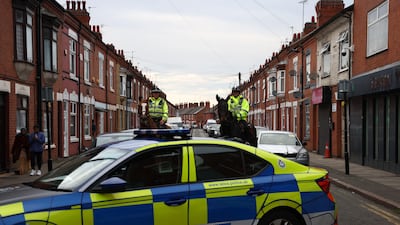The newly appointed chairman of an inquiry into unrest between Hindus and Muslims in Leicester has stepped down after receiving online abuse.
Chris Allen, an associate professor in hate studies at the University of Leicester, was due to lead the inquiry into the rioting in September, in which tensions between mainly young Muslim and Hindu men culminated in large-scale disorder in the British city.
It led to police officers being injured and nearly 50 arrests, 158 crimes and nine people being charged.
But, comments made by Dr Allen before his appointment, ruling out Islamist extremism, led to a backlash from Hindus who vowed to boycott the inquiry.
A video also emerged online allegedly showing Dr Allen claiming that the September 11 terrorist attack was a set-up.
In a letter to Leicester's mayor, Sir Peter Soulsby, signed by 13 Hindu temples in Leicester, they said they had “little confidence” in the inquiry and said Dr Allen's comments ruling out Islamist extremism in the unrest had “cast strong doubts on his suitability to lead the review”. The letter also said that “to assert a conclusion ahead of the review” raised doubts about his independence.
On Thursday, Dr Allen issued a statement to say he was stepping down.
“I have reluctantly taken the decision to stand down from the role on the basis that I no longer feel confident that my team and I are able to conduct the review in a way that the ensuing findings would meet the necessary levels of academic scrutiny," he said.
“As someone with a long history of undertaking research that is independent and impartial, the need for academic objectivity and rigour are vitally important. In the current climate, I do not believe that it is possible for me to do so in an impartial way and so it is in the interests of the city and the need to find ways to resolution that I have decided to stand down.
“It is important to stress that my decision was not made in response to the unprecedented levels of hate that have been directed towards me in recent weeks or the spurious allegations circulating on social media. While many are outright lies, some are rather more pernicious: distorting and misrepresenting the truth for their own individual and ideological gain.”
The review was set up to uncover the reasons for the unrest and to make recommendations for change.
Sir Peter, who commissioned the review, said the levels of online abuse relating to it were disturbing, and he understood Dr Allen’s decision.
“I am sorry that Dr Allen will not be able to lead the research but understand the decision that he and the university have taken," he said.
"I do think it’s important to proceed with a review, and will be taking soundings locally and nationally as to whether any individual or organisation could take it forward in a way that has the confidence of all parties concerned.”
A spokesman for the University of Leicester said it was concerned over the abuse Dr Allen had received.
“The university fully supports Dr Allen in his decision to stand down from leading the review. We have a duty of care for all of our staff, and it was concerning to see the unwarranted abuse Dr Allen was receiving online, and the effect it might also have on his research team," the university said in a statement.
“Our academic staff have the right to carry out research work without any undue interference, or any suppression, in accordance with their professional responsibility and subject to nationally and internationally recognised professional principles of intellectual rigour, scientific inquiry and research ethics.
“Dr Allen has, for two decades, researched hate extremism and the policies designed to counter them. He is widely published nationally and internationally across both the academic and non-academic spaces. His research has been submitted to various government bodies.
“The university continues to stand by the absolute impartiality of Dr Allen to conduct his research with complete independence and integrity.”


